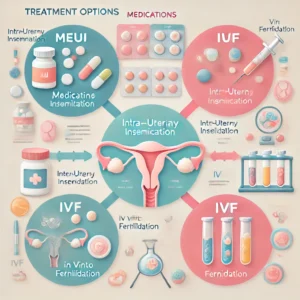Treatment Options for Infertility: Medications, IUI, and IVF
 Infertility is a condition where a couple is unable to conceive after a year of regular, unprotected intercourse or six months for women over 35. Various treatment options are available depending on the underlying causes, and they generally fall into three main categories: medications, intrauterine insemination (IUI), and in vitro fertilization (IVF).
Infertility is a condition where a couple is unable to conceive after a year of regular, unprotected intercourse or six months for women over 35. Various treatment options are available depending on the underlying causes, and they generally fall into three main categories: medications, intrauterine insemination (IUI), and in vitro fertilization (IVF).
1. Medications
Medications are often the first line of treatment, especially for cases related to ovulatory disorders. Common drugs include:
- Clomiphene Citrate (Clomid): Stimulates ovulation by encouraging the release of hormones that regulate egg development and release.
- Letrozole (Femara): Often used for women with polycystic ovary syndrome (PCOS); it promotes ovulation.
- Gonadotropins: Injectable hormones like FSH (follicle-stimulating hormone) or LH (luteinizing hormone) directly stimulate the ovaries to produce multiple eggs.
- Metformin: Used in cases of insulin resistance or PCOS to improve ovulatory function.
- Bromocriptine: Prescribed for women with high levels of prolactin, which can interfere with ovulation.
Medications may be used alone or in conjunction with other treatments like IUI.
2. Intrauterine Insemination (IUI)
IUI involves placing washed and concentrated sperm directly into the uterus around the time of ovulation, increasing the chances of fertilization. It is often recommended for:
- Unexplained infertility
- Mild male factor infertility (e.g., low sperm count or motility)
- Cervical factor infertility (e.g., thick cervical mucus)
- Couples using donor sperm
The procedure is simple, minimally invasive, and often paired with ovulation-stimulating medications for better results.
3. In Vitro Fertilization (IVF)
IVF is a more advanced and comprehensive treatment. It involves the following steps:
- Ovarian Stimulation: Hormonal medications stimulate the ovaries to produce multiple eggs.
- Egg Retrieval: Eggs are retrieved from the ovaries via a minor surgical procedure.
- Fertilization: Retrieved eggs are fertilized with sperm in a laboratory to create embryos.
- Embryo Transfer: One or more embryos are transferred into the uterus.
IVF is typically recommended for:
- Blocked or damaged fallopian tubes
- Severe male factor infertility
- Endometriosis
- Advanced maternal age
- Failed attempts with other treatments
Additional techniques like intracytoplasmic sperm injection (ICSI), where a single sperm is injected directly into an egg, may be used during IVF for severe male infertility.
Factors Influencing Choice of Treatment
- Age of the woman
- Cause and duration of infertility
- Personal preferences and financial considerations
- Response to previous treatments
Success Rates
- Medications: Can boost ovulation in up to 80% of cases, with pregnancy rates of about 20-25% per cycle.
- IUI: Success rates range from 10-20% per cycle, depending on factors like age and infertility cause.
- IVF: Success rates vary by age, averaging around 40-50% per cycle for women under 35.
Consulting a fertility specialist can help tailor treatments to your unique needs.







